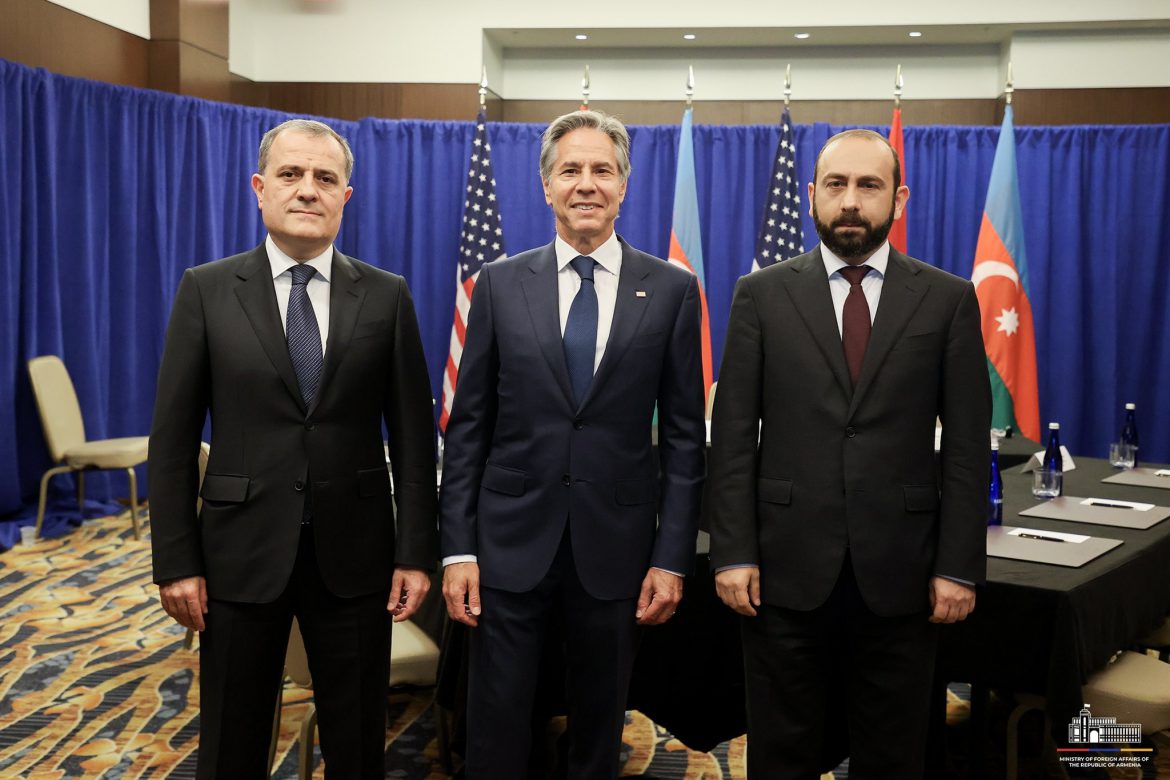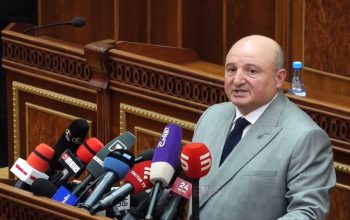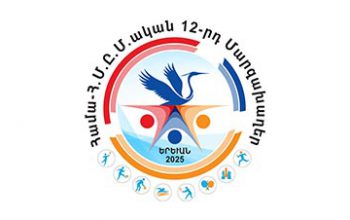YEREVAN—The foreign ministers of Armenia and Azerbaijan and U.S. Secretary of State Antony Blinken met in Washington today. The trilateral meeting was part of the NATO summit framework, which commenced yesterday and to which Armenian Foreign Minister Ararat Mirzoyan and Azerbaijani Foreign Minister Jeyhun Bayramov were invited.
Until this morning, there had been uncertainty about the meeting’s format, with only recent confirmation that it would proceed as a trilateral rather than a bilateral engagement.
“The parties noted the progress Armenia and Azerbaijan have achieved towards the conclusion of a historic agreement on peace and establishment of interstate relations, and agreed to continue the work,” brief and near identical statements from the Armenian and Azerbaijani foreign ministries read.
At the start of the meeting, Secretary Blinken praised the “very important work” carried out by Armenia and Azerbaijan over the last year and a half toward negotiating a peace agreement.
“Today is an opportunity to take stock in the progress that’s been made, what remains. But based on all of the engagements that we’ve had, including in recent weeks, I believe both countries are very close to being able to reach a final agreement, one that the United States would strongly, strongly support,” Blinken said.
On July 9, during an official reception commemorating NATO’s 75th anniversary hosted by U.S. President Joe Biden, Mirzoyan and Blinken engaged in discussions concerning the bilateral agenda between Armenia and the United States, as well as regional issues. Specific details regarding the topics covered were not disclosed by the Armenian Ministry of Foreign Affairs.
U.S. State Department spokesperson Matthew Miller highlighted America’s ongoing efforts towards fostering normalization between Baku and Yerevan ahead of today’s trilateral meeting.
“We continue to pursue a diplomatic resolution between Baku and Yerevan,” Miller remarked during a July 9 press briefing.
The previous peace talks involving the foreign ministers of Armenia and Azerbaijan under American auspices took place in June last year. Subsequently, Baku opted out of the American-led platform, citing what it perceived as Washington’s bias toward Armenia.
Today’s trilateral meeting in Washington has prompted speculation regarding its content. Political scientist Areg Kochinyan suggested that Azerbaijan’s insistence on amendments to Armenia’s Constitution, a sticking point in the peace process, may have dominated discussions.
“Currently, the demand by Azerbaijan to amend Armenia’s Constitution poses a significant political hurdle,” Kochinyan noted. “It remains to be seen whether the United States will exert sufficient political capital to overcome Azerbaijan’s demand and facilitate continued negotiations.”
Foreign Minister Bayramov underscored Azerbaijan’s renewed call for constitutional changes in Armenia on July 8.
“In January 2021, President Ilham Aliyev outlined a peace agenda for Armenia, significantly reducing outstanding issues for discussion on a peace treaty. However, Armenia’s Constitution still contains territorial claims against Azerbaijan, hindering the path to comprehensive peace,” Bayramov stated.
In February of this year, Aliyev said that peace could be achieved between Armenia and Azerbaijan if the former revises its Constitution and other relevant documents. Aliyev highlighted Armenia’s Declaration of Independence, which is cited in the preamble of the Constitution, as a point of contention, viewing its reference to the unification of Armenia with Artsakh as a territorial claim against Azerbaijan.
Armenian Prime Minister Nikol Pashinyan’s address on Armenian Constitution Day took on a contentious tone as he acknowledged this demand, reflecting a significant shift in his stance.
Speaking on July 5, Pashinyan underscored the foundational importance of Armenia’s Constitution as the bedrock of its legal system and societal norms. However, he claimed that currently, “many citizens of Armenia do not perceive the Constitution as a reflection of their own values and principles governing their lives, interactions with neighbors, communities and the broader society. Instead, there is a widespread belief that the Constitution was crafted and imposed by the ruling elite without genuine consultation or consensus among the populace.”
“In light of recent developments and external pressures,” Pashinyan stated, “there is a growing discourse surrounding the need to revise our Constitution.” This demand comes amidst ongoing regional tensions and Azerbaijan’s adamant stance on addressing what they view as impediments to a peaceful resolution.
“We need a new constitution which the people will consider to be what they created, what they accepted and believe that what is written in it is their idea of the state they created and the relations between people and citizens in that state,” Pashinyan continued.
The prime minister’s remarks suggested a departure from previous assertions of Armenia’s sovereign right to determine its own constitutional framework without external interference.
Findings from a survey conducted by the Armenia office of the international research center “Gallup” revealed significant opinions regarding Armenia’s Constitution. According to Aram Navasardyan, the center’s director, 80.3% of respondents believe the Constitution should remain unchanged, while 11.7% favor amendments to certain provisions and 3.3% support drafting an entirely new Constitution. These results were influenced by recent demands from Azerbaijan to remove references to Artsakh from Armenia’s constitutional framework.
Navasardyan contrasted these figures with earlier data, noting that in January, only 38.1% preferred keeping the Constitution unchanged, 34.2% supported amendments, and 13.4% endorsed a new Constitution.
Genesis Armenia, a prominent think tank and foundation, issued a comprehensive statement on Constitution Day, highlighting current challenges.
“Today, the Republic of Armenia’s Constitution faces unprecedented threats. There are discussions among the country’s top leadership about closing the chapter of the Third Republic, adopting a new Constitution and changing state symbols. Concurrently, leaders from Turkey and particularly Azerbaijan are insisting on constitutional changes as a precondition for signing a peace treaty and establishing diplomatic relations,” the statement reads.
“The current Constitution has been repeatedly violated by the ruling regime,” the statement continued, “with egregious examples including the overthrow of constitutional order, human rights abuses, and failure to act in safeguarding Artsakh’s security, even after its depopulation in 2023. Additionally, there is state-sponsored propaganda aimed at inciting hatred against Armenians from Artsakh, disseminated through television and the internet.”
The ongoing disregard for Armenia’s Constitution by the ruling regime weakens Armenia itself while emboldening Azerbaijan and Turkey, the statement argued. This situation also heightens vulnerability and endangerment among Armenians both within Armenia and across the diaspora.
“In these challenging times, upholding the Constitution has become imperative,” the statement said. It cited a key provision: “The usurpation of power by any organization or individual is a crime.”
“We remain steadfast in our belief that this provision will be enforced,” the statement concluded, “and that the Constitution, despite repeated violations, will once again serve the Republic of Armenia and the well-being of the Armenian people.”
Meanwhile, as Armenia and Azerbaijan engage in talks on a peace treaty, the bridge in the village of Kirants, located in the Tavush region of Armenia, has been closed. It is set to come under Azerbaijani control according to the border demarcation agreement between the two countries. This information was shared by Karen Ghazaryan, a resident of the nearby village of Acharkut, in a conversation with a correspondent from NEWS.am.
On April 19, Armenia agreed to hand control of four border villages in Tavush to Azerbaijan, marking the initial step in delineating the border between the two South Caucasus nations. The agreement was reached during the eighth round of talks between Deputy Prime Minister Mher Grigorian of Armenia and Azerbaijani counterpart Shahin Mustafayev, conducted at an undisclosed location along the Armenia-Azerbaijan border.
Ghazaryan noted that the reconstruction of the Kirants-Acharkut highway, which will serve as the new route for villagers, is nearing completion. He reported that road construction work has intensified recently, often continuing until three or four in the morning over the past 10 days to ensure completion.
“A wall will be built from the bridge to the residential buildings of the village to block the view of the enemy. A portion of this three-meter-high wall has already been constructed,” Ghazaryan said.
Discussing the current situation in the village, Ghazaryan highlighted tensions among residents, who have many unanswered questions and security concerns. “The flag of Azerbaijan and their border guards are already visible from the village. Even the color of their uniforms can be seen. Now they will be positioned at the bridge,” he concluded.
Hoory Minoyan – Armenian Weekly




